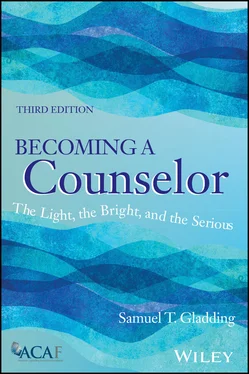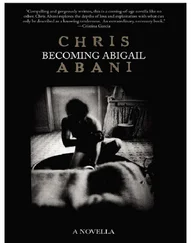Samuel T. Gladding - Becoming a Counselor
Здесь есть возможность читать онлайн «Samuel T. Gladding - Becoming a Counselor» — ознакомительный отрывок электронной книги совершенно бесплатно, а после прочтения отрывка купить полную версию. В некоторых случаях можно слушать аудио, скачать через торрент в формате fb2 и присутствует краткое содержание. Жанр: unrecognised, на английском языке. Описание произведения, (предисловие) а так же отзывы посетителей доступны на портале библиотеки ЛибКат.
- Название:Becoming a Counselor
- Автор:
- Жанр:
- Год:неизвестен
- ISBN:нет данных
- Рейтинг книги:5 / 5. Голосов: 1
-
Избранное:Добавить в избранное
- Отзывы:
-
Ваша оценка:
- 100
- 1
- 2
- 3
- 4
- 5
Becoming a Counselor: краткое содержание, описание и аннотация
Предлагаем к чтению аннотацию, описание, краткое содержание или предисловие (зависит от того, что написал сам автор книги «Becoming a Counselor»). Если вы не нашли необходимую информацию о книге — напишите в комментариях, мы постараемся отыскать её.
Becoming a Counselor — читать онлайн ознакомительный отрывок
Ниже представлен текст книги, разбитый по страницам. Система сохранения места последней прочитанной страницы, позволяет с удобством читать онлайн бесплатно книгу «Becoming a Counselor», без необходимости каждый раз заново искать на чём Вы остановились. Поставьте закладку, и сможете в любой момент перейти на страницу, на которой закончили чтение.
Интервал:
Закладка:
“Oh no,” I thought. Like any 18-year-old boy I did not know what to do when a girl cried. I had been assured by Frankie Valli and the Four Seasons on the radio that “Big Girls Don’t Cry,” and I thought June was a big girl. However, I had sense enough to ask what was wrong, as her tears had sobered me up enough to realize that this enchanted evening just might be different from what I had planned.
“Why are you crying?” I asked. “Are you filled with emotion and riveted with thoughts of you and me?”
“No,” she sobbed.
“Did you just think of something unpleasant?” I queried.
“No,” she insisted.
“What is it then?” I finally said in an open and inquiring manner.
“You just slammed the car door on my hand!” she blurted out.
Sure enough, to my dismay, as I looked up I realized that not only had I slammed her hand in the car door but it was still caught there. Thus, like an Olympic sprinter, I was out of my seat, on my feet, and around to try to relieve the pressure faster than you could say “emergency room,” which is where we ended up that night.
As embarrassing as this night was, it was not the end of my relationship with June. When she got the bandages off I visited and wrote her a sappy poem. She liked the attention and her hand finally healed. I still occasionally encounter her, but she keeps her distance, as if I might handle the occasion in the wrong way again. The faux pas of that night lives on.
I look back occasionally in reflection on that time—a hard night that still gives me chills. It is a memory of teenage awkwardness and growth. June is a reminder that the way to a young woman’s heart is not through her hand! However, events that go wrong can turn out better in the long run than they appear at first. That goes for mistakes we make in counseling as well as blunders we make in life. Time and attention to aspects of our lives that are hurt or shattered can do much to make them better.
Chapter 32 The Lakes of Wake
After transferring to Wake Forest, I quickly became involved in a number of activities. One of them was becoming the athletic section editor of the Howler , the Wake Forest yearbook. In this position I spent a lot of time on “Pub Row,” shorthand for Publication Row, where the yearbook, student newspaper, radio station, and literary magazine were all housed. I enjoyed laying out the pages and writing the copy. Yet I wanted to write humorous pieces too, and the literary magazine was a natural outlet for that.
One day, while sitting at my favorite desk on the fourth floor of the library near a window, where I could watch the sun set and get inspired to write, I decided to go for it—write a humorous essay. “The Lakes of Wake” was my first attempt. It was a rainy day, and I noticed the campus had poor drainage. Inspired by what I saw, I wrote about the ponds of water that were forming and named them all. After writing in long hand, I spent 3 hours typing. When it was finished, I was too shy to deliver it to the editor even though I knew him. I waited until I was sure everyone had left the Row, and under cover of darkness I slid my essay under the editor’s door. To my delight, I received an acceptance letter a few days later. The editor conveyed he thought my writing was “deft.” I did not know the meaning of the word but was thrilled when I looked it up.
My feet did not touch the ground for a few days because it had rained again and the lakes had reformed. Upcoming tests and essays brought me back to reality. Having my work accepted boosted my creative confidence. Still, I waited until past midnight when no one was around to submit my next piece of humor. It was on toilet paper—uh, not its essential use but rather the tradition of throwing rolls of it in the trees when Wake Forest had an athletic victory.
Chapter 33 The Beers of My Senior Year
I was somewhat naive and even a bit innocent in the ways of the world when I entered Wake Forest. I grew up in a teetotaling family (i.e., no one drank alcohol). My brother drank beer as a freshman when he went off to college because he joined a fraternity in which drinking was prevalent. However, because I was not a member of a fraternity and my brother had never offered to buy me anything alcoholic, I did not know how beer tasted or how much it would affect my behavior. My friends did though. On my 20th birthday, they decided to introduce me to beer. I immediately hated the taste but at their urging and at their expense—they were buying—I consumed a few cans hoping the taste would get better. It did not!
When we arrived back on campus I was a little woozy. My friends suggested I just lay down for a few minutes. They found a nice place on the grass in front of the chapel where they laid me out spread eagle and left. I am not sure how long I was there. Eventually the night patrol officer came along and realized that where I lay was not my usual resting spot. He asked a few questions and then helped me to my dorm room. The next morning I had a headache the size of nearby Salem Lake but was none the worse for the wear except for wrinkled clothes. I had learned that there was no similarity between beer and sweet tea and that my friends were mischievous.
The next beers of my senior year were not ones I drank but a number of beers I saw being consumed at a party the College Union was sponsoring. I was chair of the Small Socials Committee of the Union and planned off-campus dances for fellow deacons. Attendance was usually around 100. Besides planning the event, I paid the band, ordered refreshments, and acquired a chaperone—yes, off-campus parties had to be chaperoned in the 1960s! The venue for the December party was a downtown hotel, and I found a great band I knew would be a hit. For the chaperone, I persuaded what I thought was an introverted librarian in the college library to come. I figured he would bring a book and sit in a corner.
All went well for about the first hour or so. Then I noticed my reclusive chaperone seemed to be having the time of his life out with his wife on the dance floor. In each hand he had a can of beer. Some of my peers were out dancing with beers too and obviously enjoying more than the music. Uh-oh. I quickly found the source of the happiness: a bartender serving a variety of suds. Not thinking clearly, I wondered if maybe, just maybe, beer could be considered a light refreshment and allowable. To find out, I made a call to one of the deans of the university. When I popped the question, the answer came back an icy “Certainly not!” Double uh-oh!
There was only one thing to do: stop the flow of liquid gold and try to hide the evidence that the party had gone off the rails. Stopping the flow was easy, although not popular. Paying for the damage so I would not be expelled from school was more challenging. First, my peers and the librarian had consumed hundreds of dollars’ worth of alcohol, much more than the price of refreshments in my budget. Second, the laws of North Carolina at the time required the hotel to report alcohol consumption by the bottle and can. I knew that what the hotel put on the bill would affect me. With a bit of pleading (actually groveling), I convinced the management to make out a separate Wake Forest tab for me with just three words: “Food and Beverage.” The official State of North Carolina information would not be a part of my paperwork.
I have been grateful for many kind acts in my life, but the bill the hotel gave me that night is something for which I will always be thankful. Without it, I might never have graduated from college and likely would have become either a barista or a booking agent for bands.
Chapter 34 Student Government: A Moving Experience
I decided to run to be a legislator in the student government during the spring semester of my junior year. At the time, I did not anticipate being heavily involved in other Wake Forest activities my senior year. I also thought being a part of student government would be a lot of fun and I might positively influence the campus. Thus, I signed up with one of the two parties that sponsored candidates: Better Politics on Campus.
Читать дальшеИнтервал:
Закладка:
Похожие книги на «Becoming a Counselor»
Представляем Вашему вниманию похожие книги на «Becoming a Counselor» списком для выбора. Мы отобрали схожую по названию и смыслу литературу в надежде предоставить читателям больше вариантов отыскать новые, интересные, ещё непрочитанные произведения.
Обсуждение, отзывы о книге «Becoming a Counselor» и просто собственные мнения читателей. Оставьте ваши комментарии, напишите, что Вы думаете о произведении, его смысле или главных героях. Укажите что конкретно понравилось, а что нет, и почему Вы так считаете.












